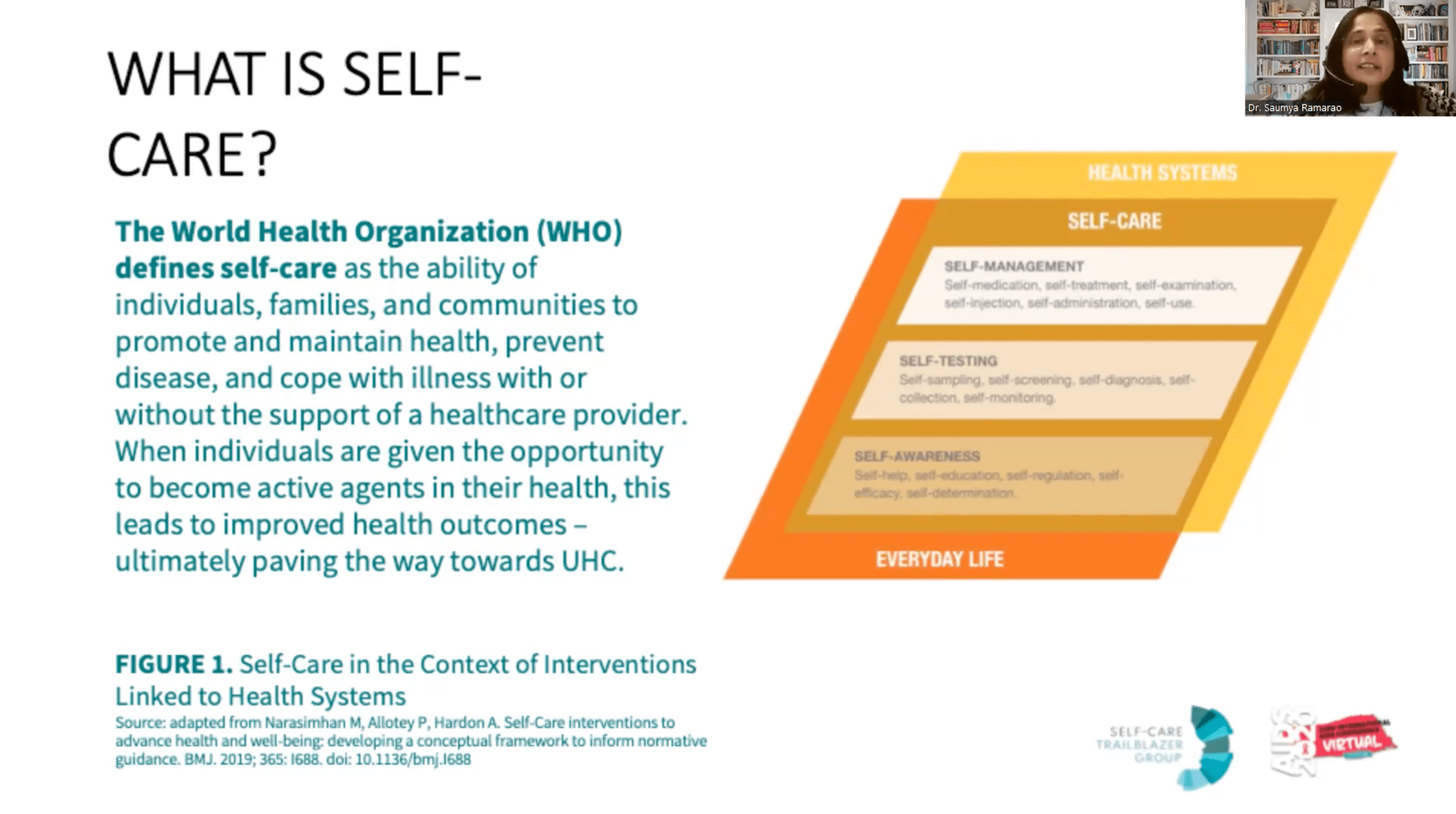Insights from Asia in Advancing Self-Care Use, Acceptability, and Access

On January 25, Knowledge SUCCESS hosted “Advancing Self-Care in Asia: Insights, Experiences, and Lessons Learned,” a panel conversation featuring experts from India, Pakistan, Nepal, and West Africa. The speakers discussed the feasibility and future of self-care for family planning (FP) in Asia and lessons learned from program experiences in West Africa. Discussions focused on what self-care means regarding contraceptive self-injection (subcutaneous depot medroxyprogesterone acetate, or DMPA-SC), and included insights from self-care projects in Pakistan and Nepal. Speakers highlighted reasons for limited self-injectable contraceptive uptake throughout Asia then shared lessons learned from experiences implementing self-injection in West Africa that could be adapted to Asian settings.
Featured Speakers:
- Moderator: Grace Gayoso (Gayo) Pasion, Asia Knowledge Management Regional Officer, Knowledge SUCCESS
- Dr. Saumya Ramarao, Senior Program Associate, Population Council; Co-chair Evidence and Learning Working Group, Self-Care Trailblazer Group
- Kanwal Qayyum, Senior Research Manager, Jhpiego Pakistan
- Govinda Prasad Dhungana, Assistant Professor, Far Western University, Nepal
- Célestin Compaoré, Regional Director, Accelerating Access to MISP-SC project, Jhpiego

An Overview of Self Care | Self-Care Trailblazers Group
Dr. Saumya Ramarao from the Self-Care Trailblazers Group began the discussion with an overview of self-care and its importance. The Self-Care Trailblazers Group has more than 300 members from over 99 countries, two-thirds of whom are outside the U.S. and Europe. The group’s vision is to advance the safe and effective use of self-care.
According to Dr. Ramarao, self-care is defined as the ability of individuals, families, and communities to promote and maintain health, prevent disease, and cope with illness with or without the support of a healthcare provider. It is people-centered and meets users’ health needs in a way that empowers them to manage their own care.
Dr. Ramarao reflected that self-care, as in the case of self-injected DMPA-SC, is important because it provides options for users to care for themselves on their own rather than having to visit health care settings. Youth, in particular, can find this useful—especially those who avoid going to health care facilities due to the stigma in some contexts around young people accessing contraception. In addition, self-care can be very helpful during crises, when the health system is over-stretched and unable to provide needed FP services.
Acceptability and Feasibility of DMPA-SC Self-Injection in Punjab, Pakistan | Jhpiego Pakistan
Kanwal Qayyum, Senior Research Manager at Jhpiego Pakistan, shared insights from a formative study conducted on the acceptability and feasibility of DMPA-SC self-injection in Punjab, Pakistan.
She shared that women are eager to learn about self-injection even though men think they will be afraid of needles. Husbands are key decision makers, without whose support women find it difficult to use self-injection—it is not easy to hide an injectable contraceptive compared to other methods such as IUDs or implants. Ms. Qayyum shared that Jhpiego Pakistan’s research found that mothers-in-law are influential, although not key decision-makers, and educated women are more likely to choose self-injection.
Self-injection does take some skill, which clients learn through illustrated and video tutorials. Even then, providers wanted to observe several self-injections by the client before being confident in her ability to self-inject on her own. The health care workers, who already make household visits, expressed the ability to re-supply clients when they visit their houses, even though the women mentioned being able to send husbands or other family members to pick up supplies.
Based on this research, Jhpiego Pakistan found that it is very important for FP service providers to be trained to coach clients and build their self-confidence as they try self-injection. Government and development sector partners’ support is critical to increase awareness and information about self-injection, so that knowledge of and trust in this option increases. At the same time, there must continue to be a range of contraceptive choices and supplies for the community to choose from as they wish.

DMPA-SC Scale-up in Rural and Remote Nepali Villages | Far Western University Nepal
Govinda Prasad Dhungana, Assistant Professor at Nepal’s Far Western University (FWU), shared insights from a DMPA-SC scale-up project in villages located in the Kailali and Achham districts.
Dr. Dhungana explained that research shows that multi-sectoral collaboration is necessary for successful scale-up of self-injection. Government commitment is crucial for success, and government leadership is necessary for procuring supplies, establishing policies, and setting guidelines. Testing in a few locations is helpful during the preparatory phase, as the Government of Nepal is doing in seven districts. Cascade training from the senior levels to the community health worker levels is another good strategy. It is also important to allocate sufficient resources for the procurement of DMPA-SC and for the management of the process, including training. Integrating DMPA-SC records into the government’s electronic reporting system is a key to success as well.
The private sector must also be mobilized to fill in any supply gaps left by the government. Ideally, supplies should reach the local levels for ease of access. Nepal’s government does not yet have a strategy to reach underserved populations with self-injection. Special populations, such as those served by FWU’s research—women living with HIV in rural areas—need to be able to access DMPA self-injection easily and locally. This would address many special populations’ need for privacy, allowing them to access FP service options without having to face stigma in health care settings.
Lessons Learned from Africa | DMPA-SC Project
Célestin Compaoré, Jhpiego Regional Director for the Bill and Melinda Gates Foundation (BMGF)-funded DMPA-SC project in eight Ouagadougou Partnership countries, shared West Africa’s lessons on FP self-care, specifically self-injectables.
He mentioned that it is extremely important to first develop a situational understanding (what works, why, and where) to build a foundation for the next steps. It is helpful to create a plan that will allow monitoring, measure distribution, and assess clients’ knowledge and understanding of self-injection, so that successes and lessons can be documented and refined. There must be working groups who address and resolve any issues that arise. Of course, an action plan and scale-up strategy are also important.
Mr. Compaoré also explained that the advantages of DMPA-SC, especially the autonomy it provides women, should be shared with the community using methods that will reach intended audiences. For example, once trained with self-injection skills, a woman does not have to rely on her local health provider. In addition, advocacy must be skillful to get community leadership buy-in. Access and availability of DMPA-SC are crucial: It should be available at all levels, everywhere.
Instructional tools on how to self-inject, including video tutorials, need to be translated into local languages. This is essential and should be shared with clients in initiation sessions. Women who have cell phones can receive the videos there and watch them in their own language. Furthermore, DMPA-SC users’ peer-to-peer experience sharing must be promoted for easier scale-up.
A multi-sector approach is best, with resources pooled by various actors to support DMPA-SC implementation. Ownership by all stakeholders and users of self-injection is important. But Mr. Compaoré stressed that while DMPA-SC is important, it should be an additional option, rather than a replacement. A range of FP method choices must still be provided.
Q&A
Read the complete list of questions and responses.
Additional Resources
- The DMPA-SC Resource Library was developed to provide comprehensive information about DMPA-SC evidence; country introduction experiences; service delivery, monitoring, and advocacy tools; and more. You can access it at www.FPoptions.org!
- WHO self-care guidelines on self-injectable contraception.
- The Evidence and Learning Working Group is currently finalizing a list of indicators on self-care that can be used in-country.





